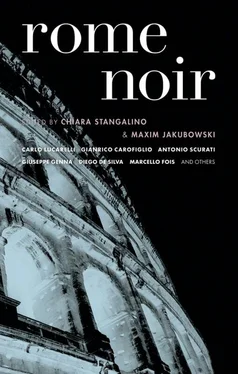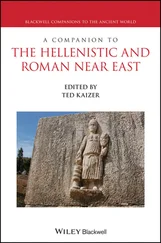Джанрико Карофильо - Rome Noir
Здесь есть возможность читать онлайн «Джанрико Карофильо - Rome Noir» весь текст электронной книги совершенно бесплатно (целиком полную версию без сокращений). В некоторых случаях можно слушать аудио, скачать через торрент в формате fb2 и присутствует краткое содержание. Город: New York, Год выпуска: 2009, ISBN: 2009, Издательство: Akashic Books, Жанр: Детектив, на английском языке. Описание произведения, (предисловие) а так же отзывы посетителей доступны на портале библиотеки ЛибКат.
- Название:Rome Noir
- Автор:
- Издательство:Akashic Books
- Жанр:
- Год:2009
- Город:New York
- ISBN:978-1-933354-64-4
- Рейтинг книги:3 / 5. Голосов: 1
-
Избранное:Добавить в избранное
- Отзывы:
-
Ваша оценка:
- 60
- 1
- 2
- 3
- 4
- 5
Rome Noir: краткое содержание, описание и аннотация
Предлагаем к чтению аннотацию, описание, краткое содержание или предисловие (зависит от того, что написал сам автор книги «Rome Noir»). Если вы не нашли необходимую информацию о книге — напишите в комментариях, мы постараемся отыскать её.
Rome Noir — читать онлайн бесплатно полную книгу (весь текст) целиком
Ниже представлен текст книги, разбитый по страницам. Система сохранения места последней прочитанной страницы, позволяет с удобством читать онлайн бесплатно книгу «Rome Noir», без необходимости каждый раз заново искать на чём Вы остановились. Поставьте закладку, и сможете в любой момент перейти на страницу, на которой закончили чтение.
Интервал:
Закладка:
The Italians take long summer vacations: usually an entire month. During the second vacation after we met, which Giulia spent at the beach with her whole family, we talked very little on the phone. It was complicated, her husband or children were always around. When finally we saw each other again, during a hot September in Rome, Giulia was more stupendous than ever: tanned, polished by the sun, slightly rounder, from days of repose and, I imagined — in vexation — from the food she had lovingly prepared over the four weeks. We made love furiously. Then I pounded her with questions. All the questions that the worm had burrowed into my body. Giulia didn’t expect it. She was stunned, almost frightened. Then she answered. She said that her husband wasn’t perfect, that their relations in twenty years of marriage had obviously changed, but that he was a good father whom the children adored, a good man, intelligent; certainly he neglected her somewhat, but not out of meanness or insensitivity — he just was like that. Once she had thought of leaving him, of divorcing, she admitted, without specifying if it had been after we met or before, but she had abandoned the idea: It wouldn’t be easy, it would have been too painful for too many people, the children would never forgive her. Then, speaking of the two of us, she asked me point-blank if I would really be willing to leave my law office in New York. She knew that I loved my work. Before I could answer, she said that she loved hers as well. She said she needed me, that she was happy when she had me near her and heard me on the phone, that she didn’t want to lose me — but life was a magical accord made up of many things: love, work, children, the city where she was born and raised, family ties. And she didn’t want to lose any of them. Then she went silent, exhausted by all these explanations that she evidently wasn’t used to.
Was it really like that, as she had said? I didn’t know. But instead of making me angry, instead of her seeming egotistical or evasive, that speech made me feel a tenderness toward her. “When your children are grown up, will it be less painful?” I asked, laughing. “When you’re old. When you’re eighty. When you’re ninety and I’m a hundred. Then I’ll carry you off. Then we’ll run away to the south in a convertible. Then you’ll be mine and only mine.”
She laughed too, relieved. “Idiot.” Her voice trembled. We embraced. We made love again. We didn’t talk about it anymore. The worm, for that day, vanished.
She hadn’t answered all my questions, but she had said something. And I myself had always theorized, when women assailed me with questions, that words count for little in a relationship; what counts are actions. Promises, explanations, confidences mean nothing; in fact, they’re a sure way to begin poisoning a relationship. Giulia was the proof of it. I thought of her as of a splendid jungle animal, guided by instinct. There were many components to her life, and the part that I played was crucial, but it didn’t exclude or cancel out the others. That was it. In meeting, we had received from destiny a talisman of happiness — and only we could damage it, destroy it, lose it. Besides, I wouldn’t have wanted to change places with her husband. How many times, proclaiming that love should always be like this, crushing, enveloping, like a dream or a drug, did I reflect that if I lived with Giulia I wouldn’t rush to leave a bouquet of flowers in her office with an anonymous note; coming home from work, I wouldn’t fling myself at her, since we would have fought because one of us had forgotten to buy toothpaste; we wouldn’t exchange phone calls punctuated by sighs, or erotic text messages. So it was better this way. The question of jealousy seemed to me closed.
Some time afterward, however, I had the temptation to do something. I was spending a week in Rome, rather than the usual two days, and, not being able, naturally, to spend it with Giulia, I found myself with a lot of free time. Some I spent walking in “our” neighborhood, up and down Via del Corso, wandering between the Pantheon and the Trevi Fountain, sitting first in one café and then another, letting myself be pulled along by the river of foreign tourists until I lost any sense of where I was. Even today, after two years of Roman vacations, I get lost in the center of the city as soon as I leave the perpendicular line of the Corso. For someone accustomed to the perfect symmetry of Manhattan, the twisting streets of the Italian capital seem a labyrinth of squares and narrow alleys, all the same: a fountain, a column, a flaking wall, a café, a market stall, a wild dog, a motorcycle, a beggar, a group of American or Japanese tourists, another fountain... And in appearing to me indecipherable, impenetrable, Rome reminds me of Giulia: mysterious, seductive, majestic, happy, talkative, endowed with an ancient wisdom, breathtakingly beautiful, capable of making you lose your head and then demolishing everything with that laugh of hers...
But I’ve lost the thread, I was saying something else: that at a certain point I had the temptation to do something. I wanted to see her husband. I knew his surname. I knew he was a lawyer. A couple of phone calls were sufficient and I knew what day he would appear in court. I went with my heart beating madly. What impression would he make? What if he was hideous, the man for whom Giulia lovingly made dinner every night? Or what if, on the other hand, he was incredibly handsome? When I finally saw him, and heard him speak in front of the judge, I realized that he was neither. He was a normal man, with the face of a decent, respectable person. Against every expectation, I found him congenial. Yes, jealousy really seemed to have passed. To ask her and myself too many questions would only ruin everything. I became even more careful than before not to compromise the secrecy of our love. Giulia was no longer alone in protecting her marriage. Now I, too, wanted to help her.
I would never have imagined, as I was thinking along these lines in the courtroom, just a short distance from her husband, in what way I was to find myself helping her. Three months ago, while Giulia was following me along the route from a café near the Pantheon to the entrance of the Raphael, a storm broke. Umbrellas opened, tourists fled, streets emptied. I turned to look at her: With her rain-wet face she was beautiful, terribly desirable. I committed an imprudence: I pushed her into a doorway and kissed her for a long time, as if in a trance, slipping my hands under her skirt, where, I knew — she had promised me — she wasn’t wearing panties. When we came out again into the street, embracing and running in the rain, someone saw us without our noticing. A man. A journalist. A colleague of Giulia’s, who had worked for years at the same newspaper, and who had tried in vain, for years, to get her into bed. He followed us to the entrance of the Raphael. Maybe he waited for us there, maybe he simply gave the doorman a tip, more generous than mine, or maybe he even had an informant. The fact is that the next day, when they were both at the office, he sent Giulia a message and began to blackmail her. Either she slept with him or he would tell her husband everything. “You’re scum,” Giulia said to him when they met in a corridor at the office. “Yes,” the man answered, and I imagined him drooling. Let me make it clear: Everyone — at the newspaper and outside it — courted Giulia. I would like to explain the reason for this fascination. She’s beautiful, of course, but it’s not only that. It’s that Giulia has a particular sensuality which certain women are granted, and by virtue of which she emanates an eroticism without realizing it, without even trying. She has the air of a woman who is ready to flirt with anyone, whereas in reality she doesn’t think about it at all. The result is irresistible. Men fall at her feet. I know because, with that innocent laugh, she told me herself. But when one of them, like the colleague in question, insists, and the pursuit becomes annoying, she won’t play, she coldly cuts it off. That man, therefore, detested her. He was like a hungry beast who follows his prey for months, years, and knows he will never be able to savage it. Giulia in spike heels. Giulia wearing boots. Giulia in shorts. Giulia with her navel showing. He was going mad. And when he saw her with me, he thought that he had finally found his chance to capture that prey. “I’m not in a hurry,” he told her, excited.
Читать дальшеИнтервал:
Закладка:
Похожие книги на «Rome Noir»
Представляем Вашему вниманию похожие книги на «Rome Noir» списком для выбора. Мы отобрали схожую по названию и смыслу литературу в надежде предоставить читателям больше вариантов отыскать новые, интересные, ещё непрочитанные произведения.
Обсуждение, отзывы о книге «Rome Noir» и просто собственные мнения читателей. Оставьте ваши комментарии, напишите, что Вы думаете о произведении, его смысле или главных героях. Укажите что конкретно понравилось, а что нет, и почему Вы так считаете.












